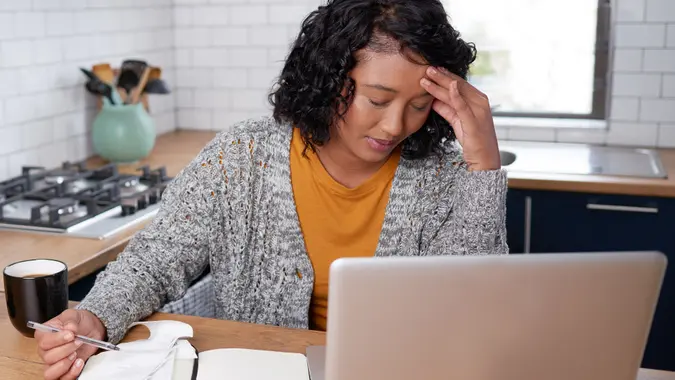Renters Save Over $900 a Month vs. Homeowners in 2025 — Should You Still Buy?

Commitment to Our Readers
GOBankingRates' editorial team is committed to bringing you unbiased reviews and information. We use data-driven methodologies to evaluate financial products and services - our reviews and ratings are not influenced by advertisers. You can read more about our editorial guidelines and our products and services review methodology.

20 Years
Helping You Live Richer

Reviewed
by Experts

Trusted by
Millions of Readers
According to recent research from Realtor.com, as of June 2025, renters can save $908 per month by leasing a home instead of purchasing a starter home in the top 50 metropolitan areas. Deciding to buy a home will likely be one of the most important financial decisions of your life, and it shouldn’t be taken lightly.
There are many factors and points to consider when debating whether to rent or buy a house, but it’s crucial to run the numbers to ensure that you make a decision that makes financial sense for your situation.
GOBankingRates consulted with real estate and housing experts to determine if it has been cheaper to rent or own a home in 2025.
The Numbers Behind Renting vs. Owning a Home
You can’t decide between renting and owning without looking at the current figures to help you make an informed decision. Realtor.com lists the median U.S. rent for July 2025 at $1,712 (down 2.5% year-over-year) and the median listing price at $439,450. For July, RentCafe reported an average national rental rate of $1,754, while Zillow reported an average of $2,072. Zillow also shared that the average home value was $368,581. It’s essential to note that rental rates will vary depending on the location and unit size.
The average mortgage payment depends on how much you paid for your home and what kind of rate you were approved for. This research, shared on Yahoo Finance, found that the median monthly mortgage payment was $2,259, assuming a 20% down payment on the median sale price of $435,300 in June, with an interest rate of 6.75%. The most recent data shared by Redfin indicated that, with mortgage rates falling to 6.58%, the median monthly mortgage payment had decreased to $2,616 by the end of August.
The most recent report from the National Association of Realtors (NAR) states that near-zero growth in home prices suggests that about half of the country is experiencing price drops, with the median existing-home price going up 0.2% on an annual basis to $422,400. The research also stated that homebuyers are in the best position in more than five years to negotiate a better home price with the inventory at its highest level since May 2020.
“Right now, renting still holds a financial advantage over taking out a mortgage for a home of your own,” said Omer Reiner, a licensed realtor and president of FL Cash Home Buyers, LLC. “The U.S. average monthly rent cost is almost 40% lower than you would pay monthly on a home loan.”
The Hidden Costs You Can’t Ignore
There are also other considerations for homeownership, such as home insurance, repairs, and HOA fees (if applicable), that you can’t forget about when deciding which option is cheaper. Alex Mendel, a real estate agent at Keller Williams Realty Boca Raton, noted that nationwide, the average rent is approximately $2,050 per month, while the average mortgage payment ranges from $2,200 to $2,300 per month. He added, “On top of that, homeowners take on added expenses like insurance, which averages around $200 a month, property taxes at about $200 a month, and HOA fees that typically range from $200 to $300 a month.”
Other Factors Impacting Renting vs. Owning
When it comes to deciding between renting and owning, you can’t ignore economic factors, such as inflation, higher prices, and tariffs. Melanie Musson, a home real estate expert with Quote.com, noted that high housing prices make buying a first home unaffordable in many areas, especially those with higher-than-average costs. She also added, “Inflation can make people have to stretch their paychecks so much that even an extra $200 or $300 a month to own a house isn’t possible.”
Reiner stressed that economic uncertainty makes it tough to predict when that balance will swing back toward homeownership. He noted that young people just starting out are picking renting over buying for several reasons. He elaborated, “It allows for low to no maintenance costs, no paying for lawn care, lower utility bills, and rental living gives you a chance to try out living in different parts of a city or even different cities entirely without being saddled with a mortgage.” If you want flexibility with your career and budget, it makes sense to choose renting over purchasing a home in 2025.
Which Option Is Cheaper in 2025?
Is it cheaper to rent or own a home in 2025? The response will also depend on where you choose to live, since the figures shared are often national. Mendel emphasized that in higher-cost areas, renting may appear more affordable, but the prices will depend on the market you choose. He worked with a couple who had moved from New Jersey to Boca Raton with the intention of renting a place. However, with rental homes costing $4,000 per month, they decided to put a down payment on a home worth $790,000 instead because they felt that, based on appreciation trends in South Florida, that home could gain $150,000 to $200,000 in equity within the next five years.
“Based on national medians and mid-2025 data, renting is more cost-effective than owning on a monthly cash-flow basis,” said Albert Lord, a real estate expert and founder of Lexerd Capital Management. “Typical homeowners pay nearly $1,800 more per month than renters once taxes, insurance, maintenance, and potential HOA/PMI are included.” Lord acknowledges that ownership is an attractive long-term wealth-building strategy, but renting provides a clear short-term affordability advantage in 2025.
Musson pointed out that even if a person or couple could technically afford the monthly mortgage payment, they may still be unable to secure a loan due to their credit score, debt-to-income ratio, and inability to make a down payment. Still, if you can afford a mortgage and qualify for one, homeownership is a better long-term housing option.
From a strictly financial perspective, renting will cost less on average than owning a home in 2025, and it’s the right choice if your decision is solely based on the bottom line at the moment. However, you’re not getting the financial advantages of building home equity when you rent, so you’ll want to ensure that you’re setting funds aside into investments to grow your money. Mendel concluded, “Renting often looks easier up front, but in the right market, ownership not only matches the cost of renting, it also creates long-term wealth.”
More From GOBankingRates
 Written by
Written by  Edited by
Edited by 


























